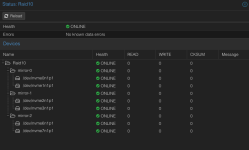Hi everyone,
We recently took on a client with a Proxmox-based cluster. One of the servers hosts a virtual machine running Nextcloud, which contains over 500 GB of small files ranging from 30 KB to 4 GB. The VM disk is in RAW format.
During the update process (while creating a backup) of the Nextcloud instance, we noticed significant delays in both write and read operations. The current IOPS for read and write fluctuates between 230 and 700, which is far too low for a mirror pool consisting of 6 NVMe drives, each with 3.5 TB capacity.

The current dataset settings are as follows:
recordsize: 16K
atime: off
sync: standard
The Proxmox server is equipped with 2 INTEL(R) XEON(R) GOLD 6542Y processors and over 370 GB of RAM.
Do you have any suggestions on how to optimize the dataset to prevent future updates from taking ages?
We recently took on a client with a Proxmox-based cluster. One of the servers hosts a virtual machine running Nextcloud, which contains over 500 GB of small files ranging from 30 KB to 4 GB. The VM disk is in RAW format.
During the update process (while creating a backup) of the Nextcloud instance, we noticed significant delays in both write and read operations. The current IOPS for read and write fluctuates between 230 and 700, which is far too low for a mirror pool consisting of 6 NVMe drives, each with 3.5 TB capacity.

The current dataset settings are as follows:
recordsize: 16K
atime: off
sync: standard
The Proxmox server is equipped with 2 INTEL(R) XEON(R) GOLD 6542Y processors and over 370 GB of RAM.
Do you have any suggestions on how to optimize the dataset to prevent future updates from taking ages?

